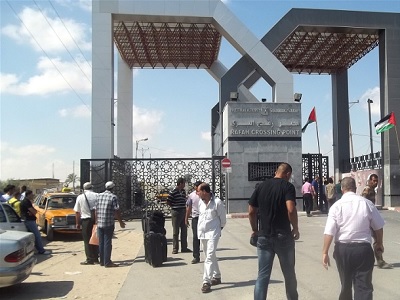
Dr. Daud Abdullah
After three years of open hostility, Egypt appears to be resetting its policy towards the Gaza Strip. Whereas in the recent past the Cairo administration has only opened the Rafah border crossing to deliver Palestinian corpses, the authorities have, in recent weeks, opened it more frequently to allow the passage of people to and from the besieged enclave. But this is not all.
Last month witnessed an unprecedented spate of official invitations from Egyptian state agencies to Palestinian businessmen, journalists and even jihadists. The first was extended to more than 30 businessmen and economists from Gaza to attend the second economic conference at the Egyptian Red Sea resort of Ain Sokhna.
One week later, an Islamic Jihad delegation headed by its exiled secretary general, Ramadan Shallah, and senior figures from the Gaza Strip were invited to Cairo for talks with Egyptian intelligence officials. That was followed quickly by a visit of leading Palestinian journalists to the government-owned Al Ahram newspaper.
All told, the frequency and sheer scope of these meetings point to a possible shift in policy. The visiting delegations represent important constituencies that could contribute significantly to improved relations with Egypt. However, while the developments of the past month can be seen as a new beginning, there is no doubt that the road ahead still remains long and challenging.
For all practical purposes, Egypt has a lot to gain from good relations with Palestine, and the Gaza Strip in particular. The coastal territory possesses no major industries and offers a consumer market that supplies two million inhabitants. Instead of taking full advantage of this market to boost its own economy, Egypt has throughout the past decade missed every opportunity to do so by maintaining the Israeli-led blockade of the territory. The net result is that while Israel ranks first as the main exporter to Palestine, Egypt is a lowly ninth even though Gaza, with its estimated bank deposits of $9.6 billion and annual trade valued at $10 billion, has the potential to become an important trading partner for Egypt.
Though by no means too late, Egypt, it seems, is finally beginning to put its own interest before that of Israel. Last month’s Ain Sokhna conference reopened discussions on the longstanding project to establish a free trade zone between Egypt and Gaza. The idea was first discussed 10 years ago during the Mubarak regime but never saw the light of day. President Mohamed Morsi tried to revive it as an alternative to the perilous tunnel economy that sprung up as a result of the blockade, but he was forced to abandon the project after being confronted with the unfounded accusations of supporting an initiative that would lead to the secession of Gaza from Palestine.
Apart from Israel, which wants to maintain its monopoly of the whole Palestinian market, the free zone was also questioned by the Ramallah-based Palestinian Authority, which lost political control of Gaza in 2007. Neither of the two are likely to support the idea as long as Hamas remains in control of the Strip. In the case of PA President Mahmoud Abbas, the matter has become even more disturbing because of the growing influence of his Fatah rival, Muhammed Dahlan. It is believed widely that the latter enjoys the full backing of the Cairo regime, as well as a number of regional states. Dahlan, who hails from Gaza, has in recent years been supporting a number of charitable initiatives there. Faced as it was with chronic economic hardship, the Hamas authority in Gaza has accommodated this activity.
While it is true that Dahlan’s “charitable” work has brought some relief to many families in Gaza it is equally true that it has earned him loyal support from disaffected Fatah elements in the territory; there is a distinct political edge to the charity. For the time being his supporters appear to be more a source of embarrassment and an irritant rather than a threat to Abbas’s grip on Fatah; he was re-elected as leader of the movement — at the age of 81 — by this week’s Seventh Fatah Conference.
Given these realities, it would be in Egypt’s best interest to seize every opportunity to engage with Hamas in an open and fair manner, without preconceptions or suspicions. After all, the Islamic Resistance Movement still has effective control of the Gaza Strip. Any attempt to dismiss it as irrelevant would be counter-productive and self-defeating to say the least. The movement has proven itself to be capable both militarily as well as politically. Even its inveterate enemy, Israel, acknowledges its enduring popularity throughout Palestine. Last October, it is believed that Abbas and the PA aborted the planned local elections to deny Hamas its expected victory.
Hamas may well have strong and uncompromising views about the Israeli occupation, but it has shown that it can be pragmatic in the pursuit of Palestinian national interests. Hence, the Hamas leadership’s acceptance of Fatah’s invitation to participate in the secular movement’s major Conference this week.
For better or worse, geography and history have locked Egypt and Gaza into a relationship of interdependency. Instead of pursing the impossible dream of going their separate ways, Egypt should now change its policy toward Gaza for the common good of the two peoples. This will not please Israel and its allies, but at the end of the day it is likely to be the best course of action to secure a more stable and prosperous future.
– Dr. Daud Abdullah is the director of Middle East Monitor, where this article was first published.




